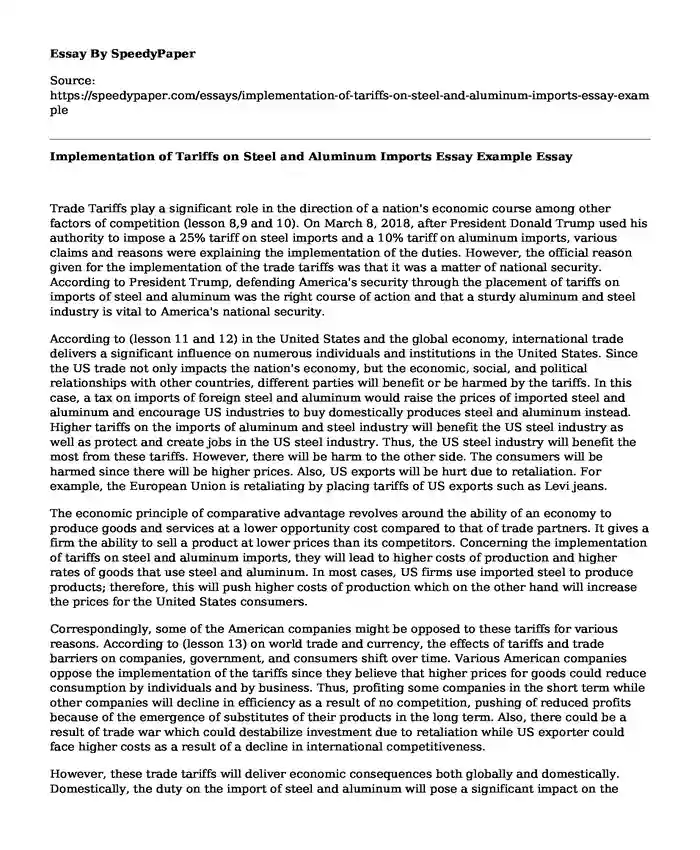
| Type of paper: | Essay |
| Categories: | Economics International relations Foreign policy |
| Pages: | 3 |
| Wordcount: | 761 words |
Trade Tariffs play a significant role in the direction of a nation's economic course among other factors of competition (lesson 8,9 and 10). On March 8, 2018, after President Donald Trump used his authority to impose a 25% tariff on steel imports and a 10% tariff on aluminum imports, various claims and reasons were explaining the implementation of the duties. However, the official reason given for the implementation of the trade tariffs was that it was a matter of national security. According to President Trump, defending America's security through the placement of tariffs on imports of steel and aluminum was the right course of action and that a sturdy aluminum and steel industry is vital to America's national security.
According to (lesson 11 and 12) in the United States and the global economy, international trade delivers a significant influence on numerous individuals and institutions in the United States. Since the US trade not only impacts the nation's economy, but the economic, social, and political relationships with other countries, different parties will benefit or be harmed by the tariffs. In this case, a tax on imports of foreign steel and aluminum would raise the prices of imported steel and aluminum and encourage US industries to buy domestically produces steel and aluminum instead. Higher tariffs on the imports of aluminum and steel industry will benefit the US steel industry as well as protect and create jobs in the US steel industry. Thus, the US steel industry will benefit the most from these tariffs. However, there will be harm to the other side. The consumers will be harmed since there will be higher prices. Also, US exports will be hurt due to retaliation. For example, the European Union is retaliating by placing tariffs of US exports such as Levi jeans.
The economic principle of comparative advantage revolves around the ability of an economy to produce goods and services at a lower opportunity cost compared to that of trade partners. It gives a firm the ability to sell a product at lower prices than its competitors. Concerning the implementation of tariffs on steel and aluminum imports, they will lead to higher costs of production and higher rates of goods that use steel and aluminum. In most cases, US firms use imported steel to produce products; therefore, this will push higher costs of production which on the other hand will increase the prices for the United States consumers.
Correspondingly, some of the American companies might be opposed to these tariffs for various reasons. According to (lesson 13) on world trade and currency, the effects of tariffs and trade barriers on companies, government, and consumers shift over time. Various American companies oppose the implementation of the tariffs since they believe that higher prices for goods could reduce consumption by individuals and by business. Thus, profiting some companies in the short term while other companies will decline in efficiency as a result of no competition, pushing of reduced profits because of the emergence of substitutes of their products in the long term. Also, there could be a result of trade war which could destabilize investment due to retaliation while US exporter could face higher costs as a result of a decline in international competitiveness.
However, these trade tariffs will deliver economic consequences both globally and domestically. Domestically, the duty on the import of steel and aluminum will pose a significant impact on the United States. For example, higher prices for consumers could affect firms in the US economy due to a decline in demand for other goods. Also, the US economy will be altered as a result of disruption effects as firms try to switch from imports to domestic production while this could also increase production costs. Internationally, the trade tariffs could lead to retaliation and trade war which creates economic uncertainty.
Conclusion
In conclusion, I believe the implementation of the tariffs on steel and aluminum imports was a good idea. According to the official reasons given by the US government about the implementation of the tax, it was an issue of national security pointing back to the nature of the US steel industry. The US steel industry had declines over the past decades as well as jobs in the industry which could be as a result of cheap imports and the US trade deficit. Thus, implementation of the tariff on the imports of steel and aluminum could be a step to the right direction as President Trump made it clear that the US government was willing to work with the partnering nations to find an amicable deal that would meet the national security requirement of America.
Cite this page
Implementation of Tariffs on Steel and Aluminum Imports Essay Example. (2022, Dec 08). Retrieved from https://speedypaper.net/essays/implementation-of-tariffs-on-steel-and-aluminum-imports-essay-example
Request Removal
If you are the original author of this essay and no longer wish to have it published on the SpeedyPaper website, please click below to request its removal:
- Essay Example on Importance of Nursing Research
- Pro-Life versus Pro-Choice - Essay Example on the Controversy
- Education Essay Example on Creating a New Medical Course in Phlebotomy
- Free Essay: Babco Report on Implementing Knowledge Management System
- Essay Sample on Tax Proposals of Bush and Obama
- Law Essay Example: The Case of Violation of EMTALA Provisions
- Essay Sample on Tourism in Ireland
Popular categories




